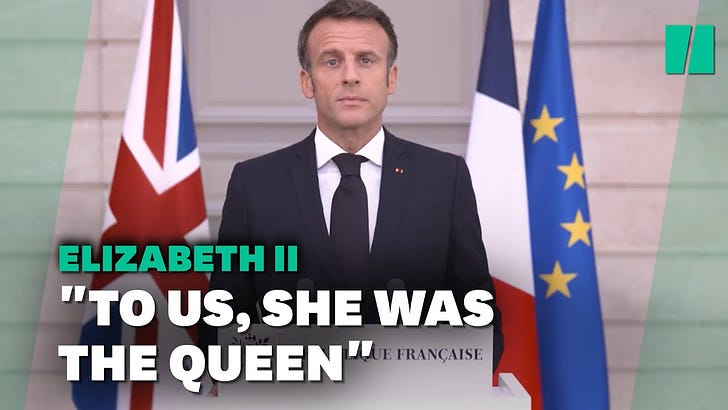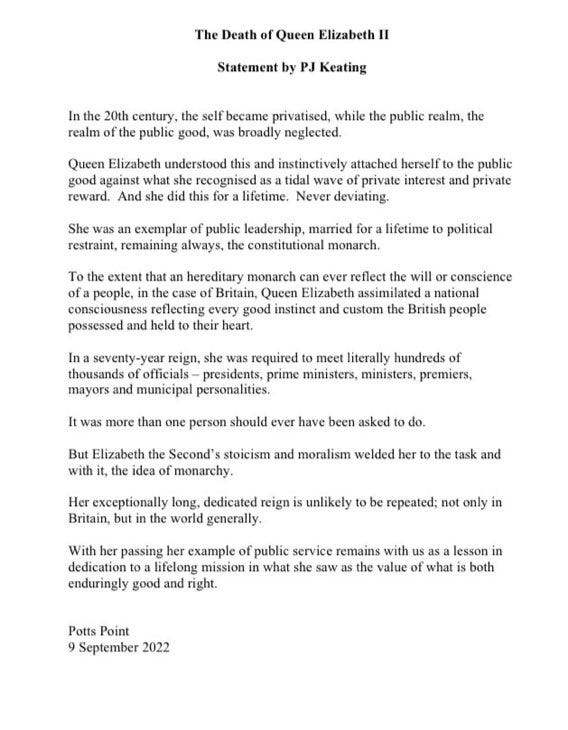Some fine tributes
Macron
Paul Keating
I e-mailed this tribute to Martin Wolf entitled “I think you might like this” and received the following reply.
I do. Good for him. On his good days, Paul is remarkable.
I met her three times. She was remarkably gracious on all three.
I think she played an invaluable role in preserving the idea of this country. More important still, she personified an ancient and great virtue: duty.
I remember the coronation!
I am really quite sad.
Martin
I replied
I can understand why you're sad. Most people with a bit of decency are sad also.
Monarchy done well is a strange institution in the modern world. Utterly demystified — at least among those who fancy themselves as above mystification. Its remaining virtue is just that — that it does not aim for perfection or for perfect justice. There is no rational justification in our world for hereditary office. Yet, ultimately if done well, that is part of its point. That if done well it might be better at keeping people out of their usual mischief than any more purely rational alternative.
And Elizabeth showed us how an ordinary person in a particular situation can lead a life of great achievement by doing no more (but no less) than her duty. That is a very uplifting thought in an age obsessed with heroic personal projects which are nevertheless freighted as never before with self-indulgence and cheap egotism.
That doesn't make me a monarchist for Australia (or necessarily for Britain though that's others' business) but it does make me one of Australia's more lukewarm republicans :)


Flirting with Armageddon: the US and Ukraine
Here are two articles sharply critical of US policies of containment from people who are normally moderate left of centre. Thomas Palley is the first.
US engagement in the Ukraine war has been driven by the Democratic Party, enthusiastically supported by its traditional allies in the mainstream media and establishment intellectual class – also known as the liberal blob. That has made criticism of the war difficult for two reasons.
First, the liberal blob has promulgated an edict of silence against those who challenge its explanation of the war and the case for US participation. The edict applies to conservatives who argue “it’s not our war”, and to independent critics who argue the war has been “made in the USA” via a thirty-year slow-motion attack on Russia conducted through eastward expansion of NATO and regime change subversion in the republics of the former Soviet Union.
Second, the US is engaged in a life and death struggle for its own democracy, with the Republican Party having gone off the rails through its embrace of Donald Trump’s protofascism. That struggle poses an awful dilemma, as criticizing the Biden administration’s Ukraine policy risks opening the door for the protofascists.
With nuclear Armageddon a possibility on the horizon, the stakes are too high for silence. The truth about the war, the Democratic Party, and the liberal blob must be spoken. There is still time to reverse course, and public opinion is capable of mastering two issues. It can both reject Republican protofascism and demand reversal of the policy of Ukraine escalation.
And Jeff Sachs
Thanks to my colleague and friend Gene Tunny for pointing me to this.
Branko on the Global Order and the Myth of Sovereignty
Interesting review by Branko Milanovic. Here’s his most interesting argument at the end of the piece.
The desire for equal sovereignty implicitly frames every country as a homogeneous entity with discrete interests. In this view, the League of Nations and other international organizations are imagined as powerful external entities clamping down on the independence of weaker states. But countries are not homogeneous; every country contains many class, social, and political groups, and some of them use international organizations to impose policies that they are not strong enough to see through the domestic political process. The Austrian government in the 1920s, as Martin notes, did precisely that when seeking to advance fiscal reforms and circumvent opposition in Parliament. Innumerable other governments have followed suit, shifting blame to foreigners (and willingly surrendering domestic sovereignty) as a way to further a particular domestic interest. They cry, “Foreigners made us do it!” … .
In Globalists (one of the books Martin cites), the historian Quinn Slobodian shows that such an approach was pioneered by libertarians and the Mont Pelerin Society they founded in Switzerland in 1947. They realized that there was no real possibility of a single world government that would advance the interests of businesses. Instead, they argued for a “double government”: “the imperium,” which would deal with political, cultural, and symbolic matters and would be fully autonomous, and “the dominium,” which would be internationally controlled and deal with economics. Within the latter, cross-country business interests would hold sway and ensure secure property rights, low taxation, and the independence of central banks (among other business-friendly measures) across borders. Should one country defect and try to pursue, say, an independent exchange-rate policy or abandon independent central banking, markets would rapidly punish the renegade. The society’s vision of the dominium is indeed at work today: powerful social and class groups within countries willingly trade portions of national sovereignty to further their own interests. …
The idea that all countries are sovereign underpins the international system. But that fundamental basis appears increasingly mythical given the ways countries surrender elements of their sovereignty. For one, weaker countries are not nearly as sovereign as more powerful ones; inequality in international relations places limits on the independence of less powerful countries. And second, countries voluntarily surrender sovereignty, however surreptitiously, because doing so benefits particular political or class factions in those societies. In other words, international organizations should not be judged against an unrealistic standard of upholding the national sovereignty of all their members, both because power is distributed unequally worldwide and because national sovereignty is divided locally among different groups with different interests. Any international economic order must rest on the precarious foundation of a world of unequal and split sovereignty.
A moose?
Or is it the Berkowitzes? Another explanation
Matt Stoller on how Australia helped Rupert out saved its newspapers
Is Britain giving up on Brexit?
Matt Goodwin on how the public mood is shifting
In recent weeks the share of British voters who now think Brexit was “the wrong decision” has been climbing to record highs.
In the latest data, more than half the country, 52%, think Brexit was “the wrong decision” while only slightly more than one third, 36%, think Leaving was “the right decision”. A further 12% say they do not know. If we strip out the undecided then six in ten voters, 59%, say Brexit was the wrong call and 41% say it was the right move.
What an utter disaster. I’d have been the first to applaud a decision to give up some income — rather a lot of it mind you — around 4% of it — for some cherished higher purpose or even one’s national dignity. But it was all based on irresponsibility that would have taken an earlier generation’s breath away.
Turkey’s opposition parties unite to stop madness (You know, like UK Labour and the Lib Dems could have done)
Turkey’s opposition has recognized the importance of unity. In the country’s 2018 national elections, the opposition parties cooperated to win parliamentary seats but fielded their own presidential candidates against Erdoğan. Unsurprisingly, it was a losing strategy. …
And now Erdoğan faces an unintended consequence of his establishment of a presidential political system. Winning national elections now requires securing 50%-plus-one of the vote, and Erdoğan can no longer count on a fragmented and divided opposition, which has finally realized that cooperation rather than competition is the key to defeating him.
This cooperation has evolved into a strong alliance since the 2019 local elections. Six opposition parties – the secularist Republican People’s Party (CHP), the Good Party (which broke away from the MHP), the Islamist Felicity Party, the right-wing Democratic Party (DP), and two AKP offshoots, the Democracy and Progress Party and the Future Party – put aside their differences and began to work together. Unlike in 2018, they plan to nominate a joint presidential candidate and, if they win the election, to ensure a democratic transition by implementing a new parliamentary system with strong checks and balances.


Joshua Gans on Mask mandates
Here in totalitarian, worse than Hitler Victoria, masks are compulsory on public transport. But that’s not enforced. So on the last tram I took, less than half the passengers were wearing masks. Meanwhile Australian economist living in Canada Josh Gans thinks aloud on mask mandates for American Economists Association conferences.
There’s too much performative whining going on — including by me. [Masks mandates at US conferences] make sense. … It isn’t anti-science for masks but is potentially misplaced for vaccines. But I suspect that even the vaccine mandate will end up being light touch as people come in from all around the world to attend.


Stoat trampolines — out they go …
Snyder contra Pinker’s Better Angels of our Nature
Partly because I have the excuse of writing my newsletter for you, I recently coughed up the very reasonable US $40 annual subscription for Foreign Affairs. And I found this in the archive. An excellent explanation of the method of Steven Pinker which is to set out to debunk those who irritate you most. In the end you end up simply not noticing others’ perspectivess. Rather you caricature them to prove the views you started out with. You and those who disagree with you are as ships passing in the night.
If, as he contends, the "pleasures of bourgeois life" prevent people from fighting, Pinker should also consider the place where these are most fully developed, and how they became so. Pinker persuasively relates how postwar economic cooperation among European states led to a pacifying interdependence, but he fails to stress that the postwar rebirth of European economies was a state-led enterprise funded by a massive U.S. subsidy known as the Marshall Plan. And he says very little about the concurrent development of redistributive social policy within those states. State power goes missing in the very places where states became preoccupied with welfare rather than warfare. …
Pinker shows his libertarian hand when he casually claims that "economic illiteracy" causes redistributive policies and thus "class conflict." Many have made this claim, of course, but as he notes without seeming to realize he is disproving his own hypothesis, today's redistributive European welfare states are the most peaceful in world history. Pinker, who exhibits no economic expertise, confuses economic literacy with a blind faith that unconstrained markets are a self-sustaining good.
A principle of the scientific method is to arrange experiments so that one's own prior beliefs can be challenged. Pinker's natural experiment with history generates instead a selective rereading, in which his own commitments become the guiding moral light for past and future. But of course libertarianism, like all other ideologies, involves a normative account of resource distribution: those who have should keep. There is nothing scientific about this, although again, like all other ideologies, libertarianism presents itself simply as a matter of natural reason, or, in Pinker's case, "intelligence." Pinker goes so far as to suggest that libertarianism is equivalent to intelligence, since holding libertarian views correlates with high IQ scores. Since he believes that the need to regularly adjust IQ tests to preserve an average score of 100 means that we are growing more intelligent generation by generation, he deduces that we are becoming more libertarian. Pinker also conflates libertarian ideology with ethics, allowing him to conclude that we are therefore becoming increasingly moral. Each step in this argument is shaky, to say the least. As Pinker might have learned from Kant or Hume or any of the other Enlightenment figures he mentions, one cannot jump from reason to morals in this way. Even if each generation is brighter than the last, as Pinker believes, being smart is not the same thing as being just. To have an account of ethics, one needs to begin from ideas of right and wrong, not simply from mental habits that happen to be widespread in one's own milieu and moment.
Pinker is to be praised for asking a crucial question—perhaps the crucial question—of modern history. But as he moves between the premodern world of violence and a postmodern style of discourse, he loses sight of the modern world in which we actually live. What he provides is less an answer to his question than a mode of reasoning that has little to do with the scientific study of the past and much to do with a worldview that happens to be his own.
Ughhh. I explained why I wasn’t reading Pinker here. Turns out I was right ;)

How do neighborhoods form?
Intriguing bunch of examples of unusually forged neighbourhoods. The image above is an aerial photo of Burning Man in case you’re interested.
The annual Burning Man festival in the Nevada desert is a fascinating case study of a semi-urban settlement. What began as a bonfire on the beach in San Francisco in th 1980s has grown into a huge annual campsite with as many as 70,000 week-long residents. It has always been a festival of arts and free expression, run with a series of anarchist principles, including radical inclusion, decommodification, communal effort, radical self-reliance, and leave no trace. The entire settlement is taken down each year, all traces are removed or destroyed, and then it is planned, surveyed, and built again the following year. Urbanists have only just begun to study Burning Man, and there is much to learn there about cities, urbanization, and social patterns.
The Burning Man site is on federal land, and the festival receives a permit each year. As the festival grew during the 1990s, people naturally gravitated toward specific areas, forming neighborhoods. These were linked by friendship and social bonds, as well as by interests (e.g., all-night loud parties in one area; campers with small children in another). But by 1996, the event had grown too large to function on its anarchist principles. People were shooting guns in crowded places, driving cars too fast and destroying tents and injuring people. The government threatened to shut down the festival (by denying the permit) unless more order were achieved.


Individual Investors: Making Their Voices Heard?
We’re reinventing the political party — for investors who want their dividends and their say!
“We cannot expect individual shareholders to express an opinion on all ballots of all the companies they own,” write Harvard’s Oliver Hart and Chicago Booth’s Luigi Zingales in recent research they did on the topic.
Moreover, rules for retirement funds instituted in the Employee Retirement Income Security Act of 1974 focus on maximizing financial rather than social value. In this case, Zingales says, “fiduciary duty creates a constraint.”
But could that change? Proxy-ballot advisors employ groups of analysts to provide guidelines for institutional funds on how they should cast votes on corporate ballots. BlackRock, the world’s largest asset manager, is giving its institutional investors the ability to participate in voting decisions on proposals raised at companies they indirectly own in certain funds, and hopes to expand the initiative to individual investors, beginning with a pilot involving a UK-based mutual fund.
There may be other options, too, for individual investors. Hart and Zingales note that Institutional Shareholder Services, one proxy advisor, has six sets of voting guidelines geared toward specific special interest groups—in essence a detailed version of a political platform. Why not let retail investors access such proxy services, choose their own set of guidelines, then request that fund managers vote on their behalf? While this is an imperfect suggestion—for one thing, proxy advisors too often “give one-size-fits-all recommendations,” says London Business School’s Alex Edmans—it would give small investors some voice. Plus, it could spur a market for such services, meaning there may ultimately be more voting choices for investors.























